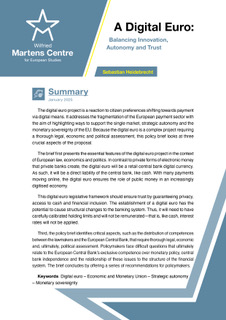A Digital Euro: Balancing Innovation, Autonomy and Trust
16 January 2025
The digital euro project is a reaction to citizen preferences shifting towards payment via digital means. It addresses the fragmentation of the European payment sector with the aim of highlighting ways to support the single market, strategic autonomy and the monetary sovereignty of the EU. Because the digital euro is a complex project requiring a thorough legal, economic and political assessment, this policy brief looks at three crucial aspects of the proposal.
The brief first presents the essential features of the digital euro project in the context of European law, economics and politics. In contrast to private forms of electronic money that private banks create, the digital euro will be a retail central bank digital currency. As such, it will be a direct liability of the central bank, like cash. With many payments moving online, the digital euro ensures the role of public money in an increasingly digitised economy.
This digital euro legislative framework should ensure trust by guaranteeing privacy, access to cash and financial inclusion. The establishment of a digital euro has the potential to cause structural changes to the banking system. Thus, it will need to have carefully calibrated holding limits and will not be remunerated—that is, like cash, interest rates will not be applied.
Third, the policy brief identifies critical aspects, such as the distribution of competences between the lawmakers and the European Central Bank, that require thorough legal, economic and, ultimately, political assessment. Policymakers face difficult questions that ultimately relate to the European Central Bank’s exclusive competence over monetary policy, central bank independence and the relationship of these issues to the structure of the financial system. The brief concludes by offering a series of recommendations for policymakers.
ENJOYING THIS CONTENT
